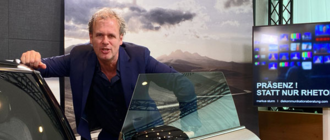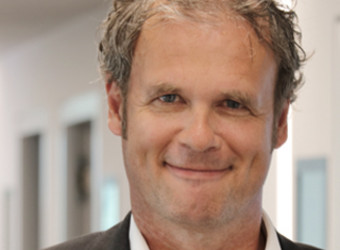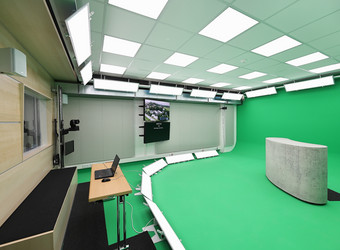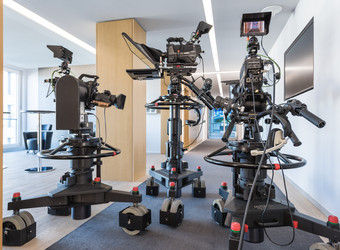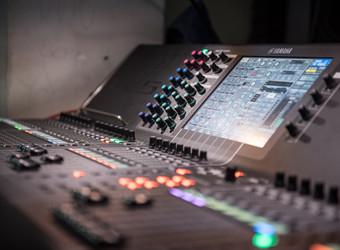Markus Sturm is a television journalist and trainer for leaders from politics, business and industry. For over 15 years he has been training heads of DAX companies and associations, from politics and the armed forces, and he also works with mbw on a regular basis. In this interview he talks about his experiences and his best tips.
Janina Singer: Markus, what exactly is media training and why is it important for managers?
Markus Sturm: Today's managers have recognised the high added value of media work. That they increase their own visibility and that of the company when they go into the media and give interviews. But of course in a controlled way. They go into my job from 0 to 100. If I had to do their job from 0 to 100, they could probably close the shop. We know that an appearance in the media has a very high reach – for your own company, the person and the messages. A "Tagesschau" alone traditionally still has 5 million viewers. If you compare that to the football stadium in Munich with its 75,000 seats, you can see what an enormous target group is reached.
What are the contents and goals of such training? What do you convey?
The goal is for the training participants to gain confidence in all possible interview formats. Whether it's a classic interview for talk shows, panel discussions or video interviews. But people who have already had training a few times also often come. My approach is to really see the whole thing as training. Similar to football: experienced players can of course take corners or penalties. But they train anyway. Professionals train! But in a protected space. Here, anything can and should happen. What I don't do is a communication seminar. Instead, I want to get as close to reality as possible and challenge the participants.
There are certainly a few things that apply to everyone in media training. Things like "don't look directly into the camera when answering" or "don't speak sentences that are too long". Nevertheless, you always say that you don't offer any off-the-shelf media training that is the same for everyone, but that the training is tailored to the individual. Why is that so important?
Because leaders are different. They shouldn't become actors or talking machines, but should bring their own personality to the table. That makes them unique and ensures that they are remembered afterwards. I therefore speak to the press offices or the leader themselves beforehand about what the participant can already do and what their respective problems and strengths are, in order to see where I need to start.
We are both journalists, so professional colleagues. All I can say is that I have sometimes felt really sorry for one or other of the interviewees during interviews when I noticed that they were finding it really difficult. You as a TV journalist must feel the same way - how many experiences like that have you had and what do you draw from them for your training?
Yes, that's right, I have had that experience too. It is particularly problematic when leaders appear in front of the camera with core messages they have learned by heart. Of course, that sounds appropriate. So once again: we don't want actors or talking machines. With the camera and the light in their faces, some people try to speak very clear written German. I can only encourage them: you don't necessarily have to speak grammatically correctly.
Yes, such memorized answers are really terrible. What other typical mistakes do leaders make in interview situations or when dealing with the media?
It is important that we don't need political, business or scientific representatives, but rather explainers! Scientists, for example, often speak very abstractly in their own bubble and are understood there. But they must know that they are going public through journalists. The rule here is: "Keep it short and simple, but not banal." It takes courage to explain things simply. A second problem: the media also have the task of asking critical questions. You therefore have to explain to the participants that an interview is not a dialogue, but that they have to pay attention. With electronic media, nothing can be authorized anymore. What the journalists have, they have. So you shouldn't get talkative in front of the camera.
I would be interested to know how such training works. Are you in a TV studio, for example, or do you just go to the bosses in their office? How does it take place?
It varies. For example, if we are training talk shows or a panel discussion or a call with an earpiece, then I recommend a studio. At mbw you are perfectly equipped with the studios and technology. You have various cameras and you can portray reality wonderfully. But of course in reality interviews also take place on site in the respective companies, for example for short news reports. In that case a conference room is sufficient. I then go there with a cameraman or woman and the technical equipment and can then do a wonderful training session.
And you then record everything and play it back afterwards to show the mistakes? Am I imagining that correctly?
Exactly, we record it and then the participant sees for themselves how they communicate. It is about three axes: the content, the non-verbal communication – for example body language, clothing or background – and the paraverbal communication. These are things like the modulation of the voice, the articulation or pauses. We analyse this and there is feedback and always a recommendation for action. The recording is then deleted. The training is always a safe space, that is important to me.
It is a lot of work. But managers never really have time and are stressed. Now they are supposed to sit in your classroom. Do you also come across bosses who don't really want to do the training and don't see why they should do it now?
No, that time is over now. That may have been the case a few years ago. Now the bosses see the added value. The problem is more that managers often don't have time. With many of them, I notice when they arrive that their minds are still on a completely different topic. I have to pick them up a bit first. I then simply act as the host.
Speaking of time. How long does it take to get a manager ready to work with media? Can you express that in hours, days or weeks?
Not really, because people are different. I don't want to sell a huge package either, you just start and then decide how to proceed. I've already had some managers in training for the fourth or fifth time. There are then update training sessions. I analyze real interviews that they have done in the meantime and then you develop them further. Depending on your skills, one training session may be enough. But I would always recommend at least monitoring the first "real" interview. After that, you'll get a concrete recommendation.
I'm also a bit curious, of course. You've been doing this for so long - and you meet a wide variety of people. What was the nicest, funniest or most interesting thing that has happened to you so far?
I have a funny or perhaps embarrassing story. A business leader had to go to the toilet during training. When he came back, his suit was wet in a prominent place at the front. It happened when he was washing his hands. He had turned the tap on too much. But things like that can happen in real life too. That's why professionals, for example, have a second shirt with them. He then simply dried himself with a blow-dryer.
Yes, the tomato stain on his shirt, who hasn't seen it? But tell me, can anyone actually learn to work in front of the camera?
I say so! It takes a bit of training, a bit of taking control of the direction and understanding how it works. Yes, you can definitely learn that.
And of course it takes proper training. But to give you a little taster: Do you have a really valuable tip for managers' media work?
Yes! Taking control of the direction yourself. That means good preparation, getting involved on set, reducing nervousness and making it clear to the journalists that you are on the same level. And: Please NEVER practice at home in front of the mirror, but in front of your smartphone. It doesn't work in front of the mirror because you're already analyzing yourself while you're doing it. Otherwise: monitoring, listening to your own employees and getting training.

